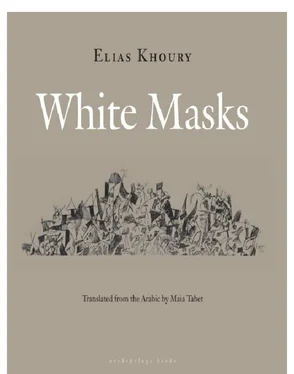Stepping inside, the woman extended her fingers to shake hands and Fatimah did likewise. They sat down, the children gathered around, and Fatimah went to the tiny kitchen to make coffee. She sensed him coming in behind her, and swung around angrily.
“I’ve married her, she’s my wife now,” he said, patting her on the shoulder.
Standing before the sink, coffee pot in hand, a great burning sensation spread between Fatimah’s shoulders and down her spine, but she said nothing. Mahmud wiped the tears from her eyes, then left her to it and went back to the other room.
The two of them drank their coffee as Fatimah sat with the children clustered around her. That woman’s manner was so different! She did all the talking and Mahmud went along with everything she said — it’s as if he had turned into a woman! Every time he tried to say something, she would interrupt him, and he would fall silent! She looked the children over and asked imperiously why little Hassan’s shirt wasn’t clean, as Mahmud concealed his embarrassment with forced smiles.
Fatimah was stunned. This man was not the husband she knew! She was aware that men did this sort of thing, Sitt Huda had warned her. “A man is a man,” she had said, “he’s free to do as he pleases.” But how could Mahmud go and marry this hag when they didn’t have enough to eat — and then play wife to her!
With nowhere to go, Fatimah, who had waited and waited for him, now felt like a stranger in her own home, as this Bahiyya woman sat there one leg crossed over the other, brazenly smoking in front of everybody, flicking the ash from her cigarette with such an air of superiority, you’d think she was Sitt Huda… and gesturing showily, making sure everyone saw those gold bracelets coiled around her wrist. . Fatimah counted, there were six of them.
Why, oh why, did this have to happen? And look at him, smiling beatifically at her. . this wasn’t the same man, not the Mahmud who beat her, the Mahmud who made her quake and beg for mercy. How he had changed — damn, how this cursed life could bring a man down!
Fatimah doesn’t know how she plucked up the courage to ask her husband where the two of them would live. The woman replied that they would stay in Kantari, in Khawaja Fadee’s building, on the third floor. And she invited the children to come over and visit.
“We’ve redone the apartment, it’s a proper home now, with three bedrooms, a living room, a dining room, three bathrooms, a small room for the maid, wall-to-wall carpeting — you know, the works! And if it weren’t for the water and the electricity being cut off, we would have hot running water and central heating!”
Then the two of them rose to leave, and Mahmud said he’d be back the next day.
But he never did come back — at least not until the day they pumped all those bullets into his body. Actually, that’s not true, he came back once before that, to tell her he’d divorced Bahiyya and thrown her out. But Fatimah didn’t believe him. “You’re lying,” she told him, “I don’t believe anything you say anymore!”
And when he did come back, his body was bloody and riddled with holes.
Everyone said he was a thief. Even at the funeral, she heard people say he had stolen that woman’s bracelets and then turned her out. But she never saw him with any bracelets, and he never said anything about them. . No, he didn’t steal. . But then why did they kill him? Fatimah doesn’t know, she’s all alone now, and this Hussein of hers has become like his father, always gone from the house. Whenever he shows up, he asks for money, and when she tells him she has nothing to give him, he starts yelling that he wants his father’s bracelets.
“But your father didn’t have any bracelets, and anyway I don’t know anything about it!”
So he hit her — the dog, hitting his own mother!
And then he disappears again, and Fatimah remains all alone, with that damned landlord Basheer al-Harati — all by herself, her work is never finished, and they threaten to kick her out. Were it not for Professor Nabeel Assi, she doesn’t know what would have become of them. You’d think they wanted her and the children to starve to death.
I was frightened, says Fatimah. No, no one else died. The war was over, but why was there still shelling? The fighting had stopped, but not the shelling. . the war’s finished, they said, and nobody’s dying anymore. Everyone was carrying on as if nothing had ever happened, as if those who had died weren’t gone forever, as if Mahmud. . oh, poor Mahmud. . how they killed you! And now there was this man, standing on the sidewalk, eating silently, and nodding his head whenever I asked a question.
“Why are you whitewashing the walls?”
Looking into her eyes, he tells her that it’s on the way.
“Listen,” he says, “it’s coming. . things are coming. Death is on the way.” Pulling the navy-blue coat tight around his thin body, he drops his head. “The things that are coming, you don’t know, no one knows… but these walls. . we must erase everything. . everything must be whitewashed, every single solitary thing.”
Pulling out a little eraser from his pocket, he goes on. “You see this eraser? They’re going to give me a bigger one.” Then he spreads his arms their full span and says. “It’ll be this big.”
“And who will give you the eraser?”
“They will. You don’t know, none of you does. . it’s a huge eraser, and it doesn’t just erase what’s written on the walls, it’ll wipe everything out. . all I’ll have to do is put it, like this, against the wall, and boom, the wall itself will disappear. No, it won’t blow up: there’ll be no noise, no explosion, no dust or debris, no rubble! I’ll put it against the wall and the wall will vanish, it’ll disappear just like that! Now you see it, now you don’t. . There’ll be a thousand men, and a thousand women, we’ll all go out, each with a huge eraser, and we will erase everything. . wipe out walls. . houses. . faces. . everything. There’ll be nothing left, everything will vanish, you will vanish and I will vanish, the city will vanish, and the posters too, everything will vanish into white, white-as-an-egg white, white as the white of your eyes, white as white. Everything will be erased. . things will fall apart, just like that, as if they weren’t falling apart. Like the officers. I used to be an officer too, but I quit. . I was the greatest officer, I’m sure you’ve heard about my exploits, how I used to kill. . how I would ambush them at the crossroads and kill them. And now I carry around the eraser. . Look! You’re not really looking, your eyes aren’t focusing… but me, I can see, I can see it all, as clearly as the palm of my hand. . my palm is white, I painted it with whitewash. . Everything is like my palm, but you don’t see my palm, no one can see it, because it’s different. And here I am, the officer, my men all around me, soldiers standing to attention in silence. I march ahead of them, they dare not breathe, and then I strike one of them with the cane I carry in my hand. But you don’t see my hand. The soldiers run away, and I laugh at them, poor wretches! They don’t know and you don’t know, no one knows the truth. And I don’t know what the truth is. But they will give it to me, and we will be a thousand men and a thousand women, can you imagine how many we’ll be? We will erase everything and die. Everything dies. . it’s as if we died, as if everything died, as if everything. . No, marriage and women aren’t for me. . I don’t go near women, but you’re different. . your cooking tastes good. . your hindbeh is delicious. . I hate food. . why don’t you drink laban? Laban is the best thing in the world. I get by on nothing but laban. ”
Читать дальше












